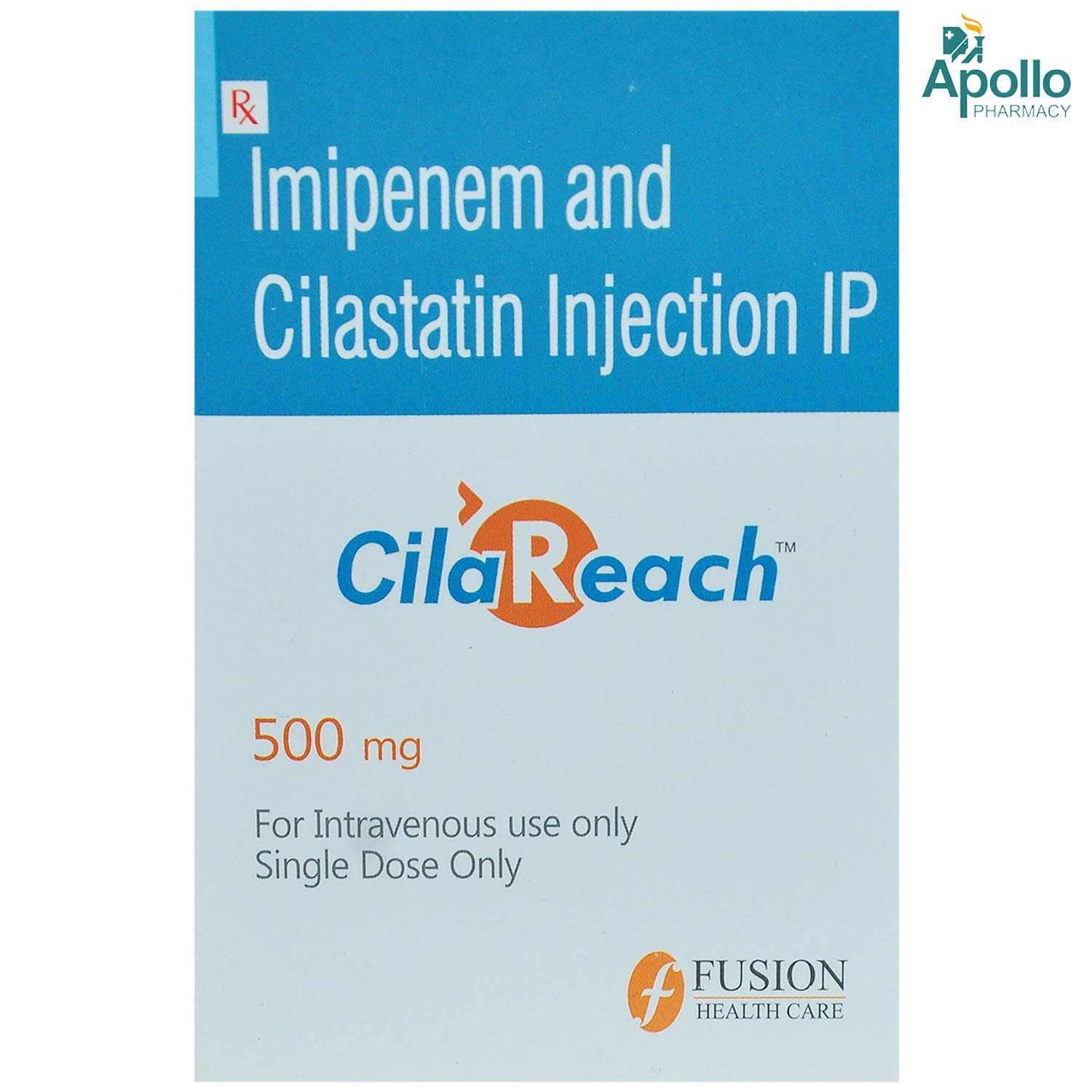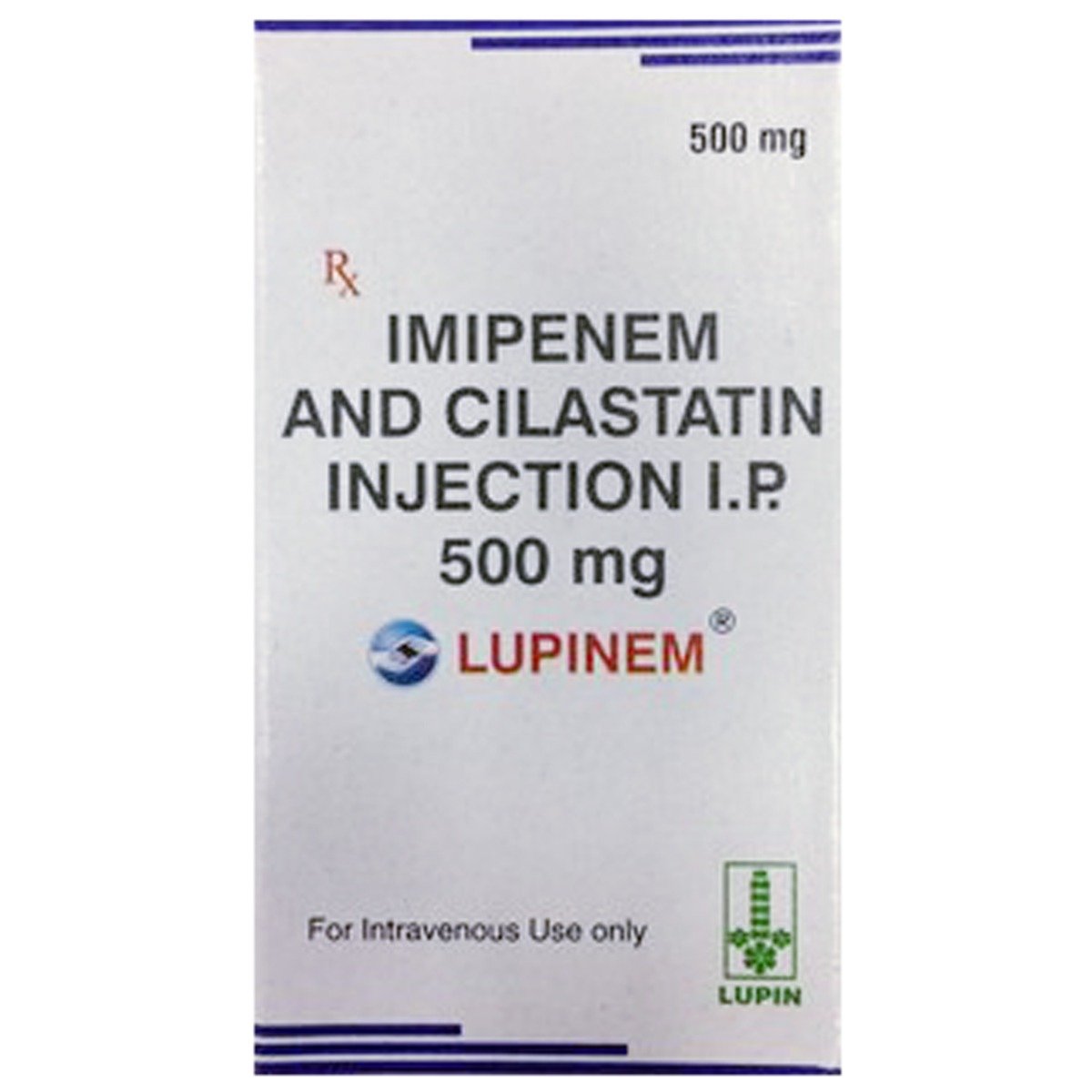Cizron 500mg/500mg Injection


MRP ₹1495
(Inclusive of all Taxes)
₹224.3 Cashback (15%)
Provide Delivery Location
Online payment accepted
 Prescription drug
Prescription drugWhats That
Composition :
Manufacturer/Marketer :
Consume Type :
Return Policy :
About Cizron 500mg/500mg Injection
Cizron 500mg/500mg Injection is used to treat severe bacterial infections of the lungs, heart, bladder, skin, kidneys, bones, joints, blood, stomach and female reproductive organs. Cizron 500mg/500mg Injection may also be used in the management of patients with low white blood cell count who have a fever, which is suspected to be due to bacterial infection. Bacterial infections are caused due to the multiplication of harmful bacteria inside or on the body. Cizron 500mg/500mg Injection does not work against infections caused by the virus, including cold and flu.
Cizron 500mg/500mg Injection is a combination of two drugs, namely: Cilastatin (dehydropeptidase inhibitor) and Imipenem (antibacterial). Cilastatin inhibits the dehydropeptidase enzyme, which causes the breakdown of Imipenem, thereby helps imipenem to stay active for a longer duration. Imipenem prevents the formation of the bacterial protective covering, which is necessary for the survival of the bacteria. Together, Cizron 500mg/500mg Injection helps to treat bacterial infections.
Cizron 500mg/500mg Injection will be administered by a healthcare professional; do not self-administer. In some cases, Cizron 500mg/500mg Injection may cause common side effects such as nausea, vomiting, diarrhoea, swelling, and redness at the site of injection. Most of these side effects do not require medical attention and will resolve gradually over time. However, you are advised to talk to your doctor if you experience these side effects persistently.
Consult your doctor if you are pregnant or breastfeeding. Cizron 500mg/500mg Injection may cause dizziness, so drive with caution. Avoid alcohol consumption as it might cause increased dizziness and sleepiness. Cizron 500mg/500mg Injection should not be given to children below one year or those who weigh below 30kg with kidney problems. Cizron 500mg/500mg Injection is not recommended in paediatric patients with CNS infections due to the risk of seizures. Keep your doctor informed about your health condition and medications to rule out any unpleasant side effects.
Uses of Cizron 500mg/500mg Injection
Directions for Use
Key Benefits
Cizron 500mg/500mg Injection is a combination of two drugs, namely: Cilastatin (dehydropeptidase inhibitor) and Imipenem (antibacterial). Cizron 500mg/500mg Injection is used to treat severe bacterial infections of the lungs, heart, bladder, skin, kidneys, bones, joints, blood, stomach, and female reproductive organs. Cizron 500mg/500mg Injection may also be used in the management of patients with low white blood cell count who have a fever, which is suspected to be due to bacterial infection. Cilastatin inhibits the dehydropeptidase enzyme, which causes the breakdown of Imipenem, thereby helps imipenem to stay active for a longer duration. Imipenem prevents the formation of the bacterial protective covering, which is necessary for the survival of the bacteria. Together, Cizron 500mg/500mg Injection helps to treat bacterial infections. Imipenem is a broad-spectrum antibiotic that is effective against a wide range of aerobic and anaerobic bacteria.
Storage
Drug Warnings
Do not take Cizron 500mg/500mg Injection if you are allergic to any of its components. Inform your doctor if you have an allergy to antibiotics, colitis, gastrointestinal disease, urinary/kidney problems, CNS disorders, seizures/fits, or liver problems. Consult your doctor if you are pregnant or breastfeeding. Avoid alcohol consumption as it might cause increased dizziness and sleepiness. Cizron 500mg/500mg Injection should not be given to children below one year or those who weigh below 30kg with kidney problems. Cizron 500mg/500mg Injection is not recommended in paediatric patients with CNS infections due to the risk of seizures. Cizron 500mg/500mg Injection may cause dizziness and sleepiness, so drive with caution.
Drug-Drug Interactions
Drug-Drug Interactions
Login/Sign Up
Drug-Food Interactions
Drug-Food Interactions
Login/Sign Up
Diet & Lifestyle Advise
- Antibiotics can alter the useful bacteria in the stomach, which help in digestion. Therefore, you are advised to take foods rich in probiotics such as yoghurt/curd, kefir, buttermilk, natto and cheese.
- Eat fibre-rich food like whole grains, beans, lentils, berries, broccoli, peas and bananas.
- Avoid foods rich in calcium, grapefruit and grapefruit juice as they might hinder the absorption of antibiotics.
- Avoid/limit the consumption of alcohol and usage of tobacco.
Side Effects of Cizron 500mg/500mg Injection
- Nausea
- Vomiting
- Diarrhoea
- Swelling
- Redness at the site of injection
Habit Forming
Therapeutic Class
All Substitutes & Brand Comparisons
RX
Out of StockNot for online saleCILANEM INJECTION 1GM
Ranbaxy Laboratories Ltd
₹325
(₹292.5 per unit)
78% CHEAPERRX
Out of StockNot for online saleCilareach 500 mg/500 mg Injection 1's
Fusion Health Care Pvt Ltd
₹658
(₹592.2 per unit)
55% CHEAPERRX
Out of StockNot for online saleCilago 500mg/500mg Injection
Gonan Pharma
₹999
(₹899.1 per unit)
33% CHEAPER
Product Substitutes
Author Details
We provide you with authentic, trustworthy and relevant information
Drug-Diseases Interactions
Drug-Diseases Interactions
Login/Sign Up
FAQs
Cizron 500mg/500mg Injection is a combination of two drugs, namely: Cilastatin and Imipenem. Cilastatin inhibits the dehydropeptidase enzyme, which causes the breakdown of Imipenem, thereby helps imipenem to stay active for a longer duration. Imipenem prevents the formation of the bacterial protective covering, which is necessary for the survival of the bacteria. Together, Cizron 500mg/500mg Injection helps to treat bacterial infections.
Diarrhoea might be a side-effect of Cizron 500mg/500mg Injection. Drink lots of fluids and eat non-spicy food if you experience diarrhoea. If you find blood in stools (tarry stools) or if you experience prolonged diarrhoea with abdominal pain, consult your doctor. Do not take anti-diarrheal medicine on your own.
Concomitant administration of Probenecid (used to treat gout and hyperuricemia) along with Cizron 500mg/500mg Injection is not recommended as it might result in an increase of plasma levels and half-life of Imipenem.
Ganciclovir (anti-viral) should not be co-administered along with Cizron 500mg/500mg Injection unless benefits outweigh the risks as generalised seizures have been reported when taken together.
Cizron 500mg/500mg Injection may cause changes in urine colour and amount of urine. Do not worry and consult your doctor if you have any concerns regarding this.
Cizron 500mg/500mg Injection may rarely cause thrush or candidiasis, which is a fungal infection occurring due to the overgrowth of yeast-like fungus in the mouth or throat. Regularly rinse your mouth with water to prevent the growth of fungus.
Drug-Drug Interactions Checker List
- GANCICLOVIR
- PROBENECID
- VALPROIC ACID
- DIVALPROEX SODIUM
- WARFARIN
Special Advise
- Cizron 500mg/500mg Injection may cause abnormal Coombs, liver, blood, and kidney function tests. Inform the person doing the tests that you are on treatment with Cizron 500mg/500mg Injection.
Disease/Condition Glossary
Bacterial infections: A bacterial infection is a condition in which harmful bacteria enter, multiply, and infect the body. Harmful bacteria produce chemicals known as toxins, which can damage tissue and cause sickness. Symptoms of bacterial infection include fever, chills, and fatigue. Anyone can become infected with a bacterial infection. But, people with a weak immune system or taking immunosuppressive medicines are more prone to bacterial infection.

Have a query?
Alcohol
Safe if prescribed
Avoid alcohol consumption as it might cause increased dizziness and sleepiness.
Pregnancy
Consult your doctor
Please consult your doctor if you are pregnant or planning for pregnancy. Your doctor will prescribe Cizron 500mg/500mg Injection only if the benefits outweigh the risks.
Breast Feeding
Consult your doctor
Cizron 500mg/500mg Injection may pass into breast milk. Please consult your doctor if you are breastfeeding; your doctor will decide if Cizron 500mg/500mg Injection can be given to breastfeeding mothers or not.
Driving
Safe if prescribed
Cizron 500mg/500mg Injection may cause dizziness and sleepiness. Avoid driving or operating machinery unless you are alert.
Liver
Consult your doctor
Dose adjustment may be needed. Please consult your doctor if you have liver impairment/liver disease.
Kidney
Consult your doctor
Dose adjustment may be needed. Please consult your doctor if you have any concerns regarding this or if you have kidney impairment/kidney disease.
Children
Safe if prescribed
Cizron 500mg/500mg Injection should not be given to children below one year or those who weigh below 30kg with kidney problems. Cizron 500mg/500mg Injection is not recommended in paediatric patients with CNS infections due to the risk of seizures.






_0.jpg?tr=q-85)

